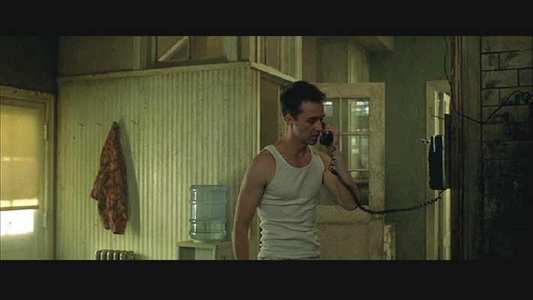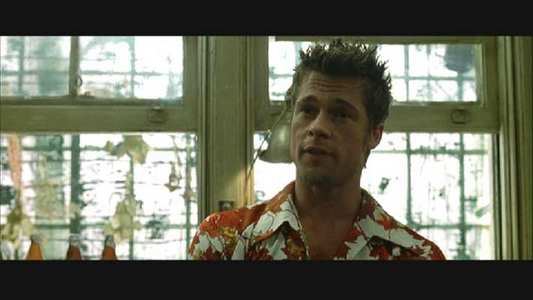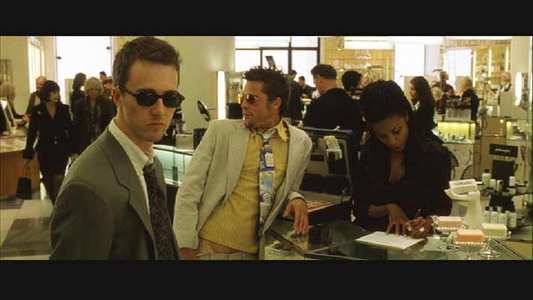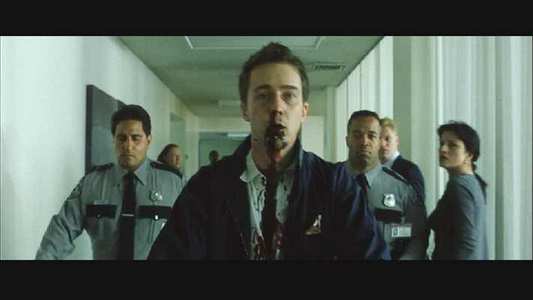Review of Fight Club
Introduction
Edward Norton plays Jack, a rabbit-in-headlights corporate drone whose Nightmarish Walter-Mitty-in-Hell hallucinations are destined to drive him over the edge. Jack’s life sucks. Conspicuous consumption has taken its toll, the frustrations and loneliness of a Kafka-esque isolation in a banal shopping mall society has run its course. His mountains of IKEA furnishings and Gucci wardrobe no longer fill that soul shaped hole, so he decides to try drastic measures: stealing emotions from the terminally ill like a be-suited emotional leech (with his pale skin, semi-conscious leer and those insomniac’s eyes with scarlet bags, Jack passes for near-death remarkably well). Also indulging in these acts of emotional degradation is Marla (Helena Bonham Carter, in a performance than can best be described as a raccoon meeting a doormat) another certified tourist to whom Jack develops a swift animosity. “If I had a tumor, I’d call it Marla”. Soon, Jack is back into sleepless nights, unable to breakdown on cue: “Her lie reflected my lie, and I felt nothing.”
Fortunately, Jack’s sickening vacuum of an apartment is blown to smithereens, and our disheveled hero hooks up with Neitzchean anarchist Tyler Durden (an impressive, iconic performance by Brad Pitt). Tyler talks much of self-actualization, self destruction and giving into primal urge. He is the will-to-power made flesh and his methods of social reconnection aren’t exactly subtle: go to underground clubs and pound each other into hamburger. The Fight Club is brutal but effective, spawning a number of clone clubs around the country, with Tyler being hailed as an underground Ubermensh for disenfranchised Gen-X-ers who wouldn’t exist if it weren’t for angst. The emasculating misery of a society in which gender roles have gotten more than a little confused, is swiftly resolved by a therapeutic bout of cathartic fisticuffs. Soon, the malaise-quenching turns to anger, and Fight Club becomes a near totalitarian secret society of civil disobedience: corporate symbols are destroyed, officials are threatened, consumer icons are ridiculed, and the fall of modern society is plotted and readied for execution.

Video
Breathtaking. Not only is the feature presented in its original anamorphic widescreen, the disc is fitted with a specially designed THX system which adapts the presentation to suit your set-up. Perfect. Literally.

Audio
Equally breathtaking. Although this would have been a good time to use DTS, the Dolby 5.1 soundtrack is groundbreaking, particularly given the multiple layers of music, ambience, sound effects and dialogue present in almost every scene.

Features
Where to start? On Disc One we get the feature itself (and a crisply menacing menu) plus 4 separate audio commentaries. Included here are David Fincher, Helena Bonham Carter, Brad Pitt, Edward Norton, screenwriter Jim Uhls and novelist Chuck Palahniuk, plus a technical commentary from senior crew. I imagine the three way between Fincher, Pitt and Norton (with Bonham Carter recorded separately) will provide the most engaging in terms of entertainment value as it does deal with the film’s central themes and concerns in most acute and amusing fashion. On the Additional Features disc we are literally drowned in extra features: a cavalcade of behind-the-scenes featurettes, each featuring commentary tracks plus a variety of alternative audio tracks or multi-angle selections. The special effects features are certainly eye-opening, watching Kevin Tog Haug, Rob Bottin and their team pull ground-breaking techniques from thin air, then cast them aside when something better turns up. Watching these featurettes, you get the feeling your looking over the shoulders of the filmmakers. In keeping with the film’s manipulation of promotional misinformation, ‘Fight Club’ comes complete with an unprecedentedly huge Publicity Gallery, featuring trailers (the US theatrical trailer is, frankly, masterful) TV Spots, Internet Spots, even a couple of cheeky Public Service Announcements that were pulled from a theatrical run by a nervous studio. Studio pulls are also featured in the deleted scenes gallery, which makes up for what the scenes themselves lack in quality by being highly indepth. Each scene comes with a concise explanation why they were deleted or changed, a comparison with the final scene and multi-angle capability. The Art Gallery, featuring some storyboards, advertising and some grueling make-up work, is as comprehensive as you could imagine. Stocked. You might say.

Conclusion
Arriving with a storm of controversy in a Post-Columbine US Climate of moral discontent and cultural debasement. Attacked from the left, the right, and everywhere in between, there’s probably something to tick off everyone in David Fincher’s feisty adaptation of Chuck Palahniuk’s irreverent Ballardian novel. Fincher’s blistering guard-dog narrative certainly underlines Palahniuk’s anti-consumer society tirades. The film’s tapped in speed-freak urgency (this is one of the most ceaselessly exciting films in some time) is more like downloading than storytelling, giving the film a relentless, scrappy energy that overcomes the naïve social Darwinism and the often hypocritical delusions of grandeur.
Fight Club’s spiral into a progressively buckling social madness is never particularly convincing, even satirically (although superficially, it is blisteringly realised). There’s nothing but ham-fisted ridicule for the fascistic musings of Tyler’s Space Monkeys, who chant their master’s mantras ad nauseum: “You are not a beautiful and unique snowflake… you are the same decaying organic matter as everything else” etc etc. This would become tedious, but there’s a sardonic wit and cunning subversiveness to Jim Uhls electric screenplay, Jeff Cronenweth’s gutter-pantomime photography and especially The Dust Brothers almost revolutionary, oddly expressionistic trip-hop wire-head score that seems to have a greater understanding of the movie than Fincher does. The performances keep the whole thing buoyant throughout, lending the film a human anchor amongst Fincher’s stylistic confidence. Pitt and Norton play the obvious Tyler/Jack love story to tongue in cheek perfection, particularly aided by a mind-bending third act twist, that is the cherry on the absurdist cake. Bonham Carter, lumbered with another one of Fincher’s tediously bland female characters, remains witty and oddly moving throughout, jousting brilliantly between Tyler’s flashy testosterone and Jack’s bleak sarcasm. On the surface, ‘Fight Club’ is nothing but a bitterly consistent delight.
And that is, hopefully, where you will leave it. The film is best appreciated as a forceful, engaging, witty and inventive piece of entertainment. A gimmicky, giddy bout of pseudo-sophistication that doesn’t begin to take itself seriously. Fincher, meanwhile, is undeniably a cinematic sorcerer of often disarming cleverness: After the dreariness of ‘Alien 3’, the overwhelming bleakness of ‘Seven’ and the ‘Hitchcock in a tumble drier’ elegance of ‘The Game’, ‘Fight Club’ is probably the most Fincherian film to date: aesthetically bewitching, morally neutral (even a little sleazy), structurally shrewd, emotionally castrated and ultimately rather nihilistic, despite the filmmakers’ ecstatic claims to the contrary. The ending, oft ridiculed, is a near Kubrickian delight of catch-your-breath absurdity: threatening, manic, eclectic, free-wheeling; although the relatively Liberal payoff bares even less examination than the rivers of Durdenisms. Richer than any of his previous films, its also the most confused: Tyler’s basis for Fight Club as an answer to the 10 step self-improvement culture is particularly contrived, considering Fight Club itself adds up to nothing more than the ‘masturbation’ of self-improvement in its most self-determining guise. Ultimately, the anarchic shenanigans lie in an ideology that is little more than Oprah with broken teeth. From the production material, its more than clear that the makers of Fight Club were high on their own self-satisfied cleverness, which has morphed itself into an extraordinarily smug and self-congratulatory movie. Most of the time, this is deserved: the bleak, nihilist tones of ‘Seven’ have been truncated (relatively) for something more obvious (and certainly more dogmatic, given the film’s plethora of anti-capitalist sloganeering.)
Fight Club is a most dazzling and memorable spectacle, and a witty and often incisive satire. It is Hollywood entertainment from the top drawer (and how often do we get to say that without a trace of sarcasm?) It bears the residue of intelligence and wafts of bungled mixed metaphors. It is blitzed, decadent, slick, instinctive, calculating. It is brilliant and bungled. Airborne and Ground Zero. It will delight and infuriate and it will spit you out the other end, galvanized, but alas, none the wiser. ‘Fight Club’ seems to see itself as the final postmodern cinematic endeavor of the 20th Century. It shrieks and bites and sends us kicking and screaming into the new Millenium, whether we like it or not. It is a skittish assemblege of parts and ideas, a shallow and profound amalgamation of every conceivable form of media. It is wild and adventurous, fitful and incendiary. It is a jigsaw whirlwind masterpiece.
Your Opinions and Comments
Be the first to post a comment!